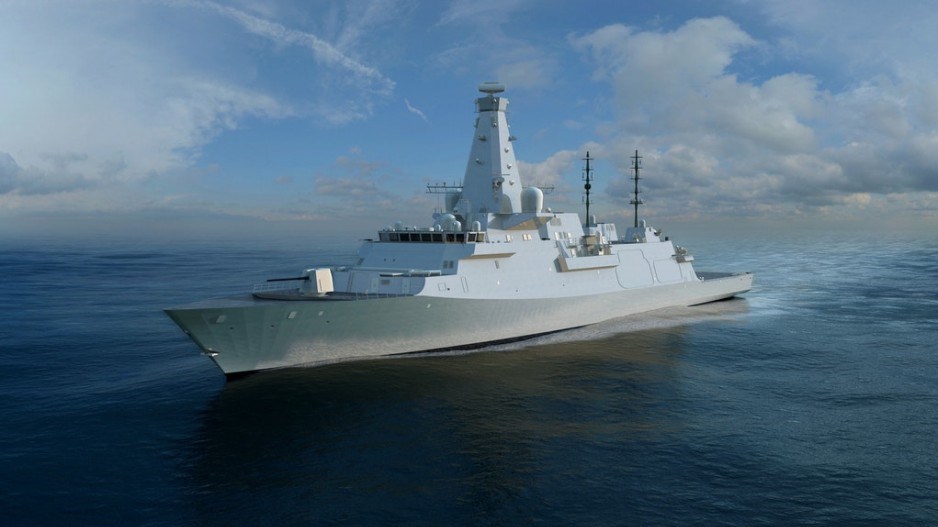With as much as $60 billion on the table, Chris Pogue doesn’t have a problem being patient with Ottawa’s single biggest purchase: the Canadian Surface Combatant (CSC) program.
“Whenever there’s anything like that, they’ll go at the pace they go at,” said the executive at Vancouver-based aerospace firm MDA.
Plans to replace the Royal Canadian Navy’s aging fleet of frigates with 15 new warships hit a brief snag in late November, a month after the federal government announced a consortium featuring MDA and led by Lockheed Martin Canada as its preferred bidder.
The Canadian International Trade Tribunal (CITT) ordered the federal government to hit the pause button on awarding any contracts following a complaint from rival bidder Alion Canada.
The issue at hand was whether the Lockheed Martin consortium could deliver on three mandatory requirements.
The CITT lifted the order last month, but it remains to be seen when the federal government will either officially award the bid to the Lockheed Martin consortium or move on to another bidder.
“We expect to award a contract for the design work to the winning bidder this winter, but will take the time needed to get it right,” Department of National Defence spokeswoman Jessica Lamirande told Business in Vancouver in an email. “We are targeting to begin construction in the early 2020s, with the first ship anticipated to be delivered in the mid-2020s time frame.”
Pogue, who serves as president of MDA’s government division, sees the contract as a potential game-changer.
“What’s exciting, I think, to me is [creating] a national shipbuilding industry, and that kind of commitment is a positive shift for Canada,” he said. “So if it takes a little longer but we do it the right way and we have the right program that’s going to be with the military – and particularly the navy – for 50 years, I think we can wait a little bit.”
Lockheed Martin is proposing to build Type 26 warships from the U.K.’s BAE Systems at Irving Shipbuilding Inc. in Halifax.
In addition to MDA, BAE and Lockheed Martin Canada, the consortium features CAE Inc. (TSX:CAE), L3 Technologies Inc. (NYSE:LLL) and Ultra Electronics (LON:ULE).
MDA’s role in the consortium is to provide electronics, antennas, radar, software and system engineering for the Royal Canadian Navy’s new ships.
As the preferred bidder, the consortium is undergoing a due diligence process that includes negotiating intellectual property rights, an assessment of combat systems performance and an assessment of the company’s financial capability to deliver the project.
MDA, originally known as MacDonald, Dettwiler and Associates Ltd., was founded in Vancouver; however, it has since moved into the orbit of the U.S. to gain access to valuable American government contracts.
In January 2017, MDA and its U.S.-based Maxar Holdings subsidiary entered into a security control agreement with the U.S. Department of Defense.
The agreement allowed MDA to pursue classified U.S. government programs as it sought to become incorporated in the U.S. In October 2017, MDA completed a US$2.4 billion acquisition of Colorado-based DigitalGlobe Inc., setting it on a path to be fully incorporated as an American company by 2019.
The new parent company, Maxar Technologies Ltd. (TSX:MAXR), is led by American Howard Lance, who is based in the U.S.
MDA’s new group president, Mike Greenley, is based out of MDA’s office in Brampton, Ontario.
But Pogue said MDA still expects to do much of its work out of B.C.
The federal government awarded MDA four separate defence contracts in December under the joint venture Defence Innovation Research Program.
At $3.8 million, the value of the contracts doesn’t quite match the potential behind the CSC contract.
But the bulk of the work will be done out of MDA’s Richmond facility, where the contracts include projects related to maritime surveillance and extracting meaningful data from radar imagery.
“A lot of these programs that we’re putting forward are really starting to leverage into the [artificial intelligence] and the deep learning domains,” said Jennifer Busler, MDA’s director of research and development.
She said the company has been recruiting additional experts locally to work on the new contracts.




